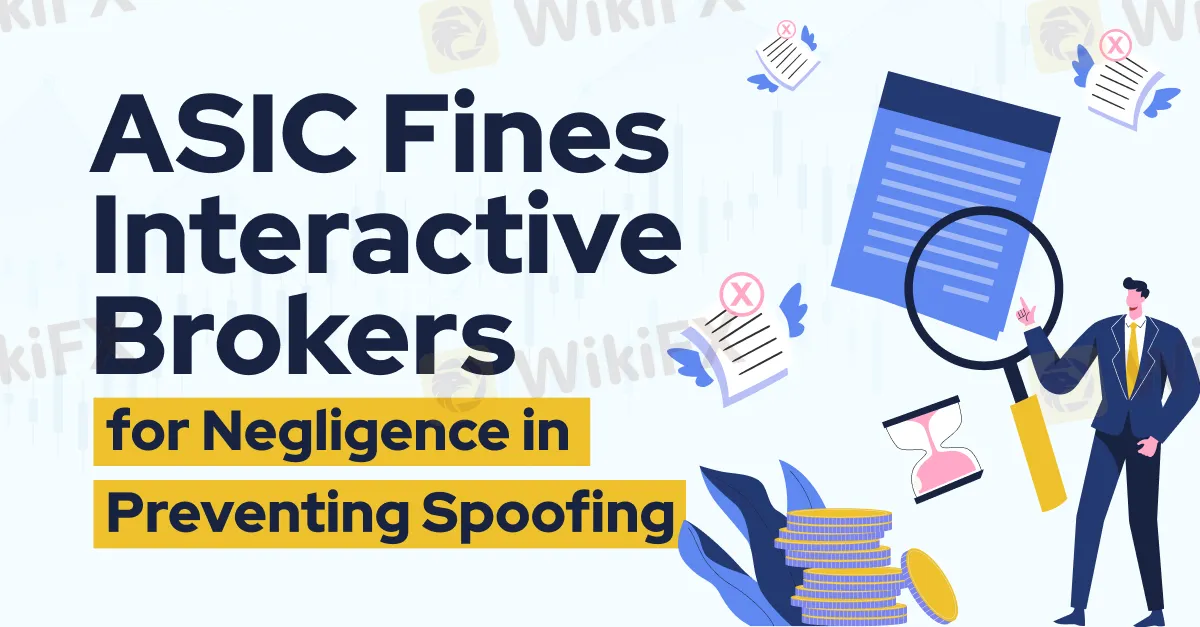简体中文
繁體中文
English
Pусский
日本語
ภาษาไทย
Tiếng Việt
Bahasa Indonesia
Español
हिन्दी
Filippiiniläinen
Français
Deutsch
Português
Türkçe
한국어
العربية
ASIC Fines Interactive Brokers for Negligence in Preventing Spoofing
Abstract:The Australian Securities and Investments Commission (ASIC) has determined that Interactive Brokers displayed negligence in identifying and preventing suspicious trading by one of its clients, raising concerns about the discount brokerage's compliance with financial regulations.

The Australian Securities and Investments Commission (ASIC) has recently determined that Interactive Brokers exhibited negligence by failing to detect suspicious trading activity that one of its clients conducted. Furthermore, the regulatory body found that Interactive Brokers displayed recklessness by permitting these suspicious transactions to persist, even after ASIC had raised concerns. ASIC's investigation also revealed that the discount brokerage firm did not maintain the requisite resources to ensure compliance with prevailing financial regulations.

Background of Interactive Brokers:
Interactive Brokers (IB) is a multinational online brokerage firm that offers a wide range of trading products and services to individual investors, professional traders, institutions, and hedge funds. IB is known for its low trading commissions, advanced trading tools, and global reach.
IB offers trading in stocks, options, futures, currencies, bonds, funds, and cryptocurrencies on over 150 markets worldwide. The company also provides margin lending, short selling, and other investment services.
IB's flagship trading platform is Trader Workstation (TWS), which is a powerful and customizable platform that offers a wide range of trading tools and features. IB also offers a mobile trading app and a web-based trading platform.
IB is a well-respected and regulated brokerage firm with a strong track record of financial stability. The company is headquartered in Greenwich, Connecticut and has offices in over a dozen countries.

A statement issued by ASIC emphasized that market participants bear a critical responsibility as gatekeepers in identifying and preventing suspicious trading activities. They must establish effective controls and allocate sufficient resources to identify and disrupt potential market misconduct promptly. Furthermore, they must respond swiftly to any concerns brought to their attention by ASIC.
Specifically, ASIC's scrutiny focused on a series of Closing Single Price Auction (CSPA) orders executed by an experienced trader client on the ASX between March 10 and November 5, 2021. The Market Disciplinary Panel (MDP) determined that Interactive Brokers should have been vigilant regarding the suspicious nature of these orders. Several factors, including the timing, low volume and value of the orders, their impact on the price of OCC shares, and their inconsistency with the client's prior trading history, should have raised red flags.
The MDP's investigation ultimately concluded that Interactive Brokers had allowed its client to place these orders to manipulate the closing price of OCC shares. The trader employed a deceptive tactic by entering orders he never intended to execute, creating a false signal that deceived competitors and influenced market movements. Subsequently, he promptly cancelled these misleading orders and executed actual trades in the opposite direction, as alleged in the complaint.
Despite receiving alerts from ASIC, Interactive Brokers failed to take appropriate action and allowed the client to continue trading suspiciously. In light of these deficiencies, ASIC deemed Interactive Brokers' response inadequate and identified a shortage of staff possessing the requisite skills and supervision.
As a result of these findings, Interactive Brokers has been directed to pay a penalty, although it has not admitted guilt or liability in this matter.
Earlier in March, ASIC had temporarily suspended Interactive Brokers' stock lending products, known as 'SYEP Derivatives.' These products enable retail investors to lend their securities to the broker, who typically lends them to other parties for short selling. ASIC's action was prompted by concerns that Interactive Brokers had included investors in the target market who did not align with the product's characteristics and associated risks.

Disclaimer:
The views in this article only represent the author's personal views, and do not constitute investment advice on this platform. This platform does not guarantee the accuracy, completeness and timeliness of the information in the article, and will not be liable for any loss caused by the use of or reliance on the information in the article.
Read more

Top 10 Trading Indicators Every Forex Trader Should Know
Master the top 10 Forex trading indicators to analyze real-time Forex quotes, trends, and market signals. Learn strategies to boost accuracy and avoid mistakes.

Malaysian Influencer Detained in Taiwan Over Alleged Role in Fraud Scheme
Malaysian influencer Hu Chang Mun, widely known as Ady Hu, has been detained in Taiwan for his alleged involvement in a fraudulent operation. The 31-year-old, who was reported missing earlier in December, was located by Taiwanese authorities after suspicions arose regarding his activities.

WikiEXPO Global Expert Interview: Simone Martin—— Exploring Financial Regulation Change
In the midst of financial innovation and regulation, WikiGlobal, the organizer of WikiEXPO, stays abreast of industry trends and conducts a series of insightful and distinctive interviews on pivotal topics. We are delighted to have the privilege of inviting Simone Martin for an in-depth conversation this time.

MultiBank Group Wins Big at Traders Fair Hong Kong 2024
Discover how MultiBank Group, a global leader in financial derivatives, secured three prestigious awards at Traders Fair Hong Kong 2024, highlighting its innovative trading solutions and industry excellence.
WikiFX Broker
Latest News
Geopolitical Events: What They Are & Their Impact?
Volkswagen agrees deal to avoid Germany plant closures
Top 10 Trading Indicators Every Forex Trader Should Know
WikiEXPO Global Expert Interview: Simone Martin—— Exploring Financial Regulation Change
TradingView Launches Liquidity Analysis Tool DEX Screener
MultiBank Group Wins Big at Traders Fair Hong Kong 2024
'Young investors make investment decisions impulsively to keep up with current trends' FCA Reveals
Why Do You Feel Scared During Trade Execution?
CySEC Settles Compliance Case with Fxview Operator Charlgate Ltd
Malaysian Influencer Detained in Taiwan Over Alleged Role in Fraud Scheme
Currency Calculator


